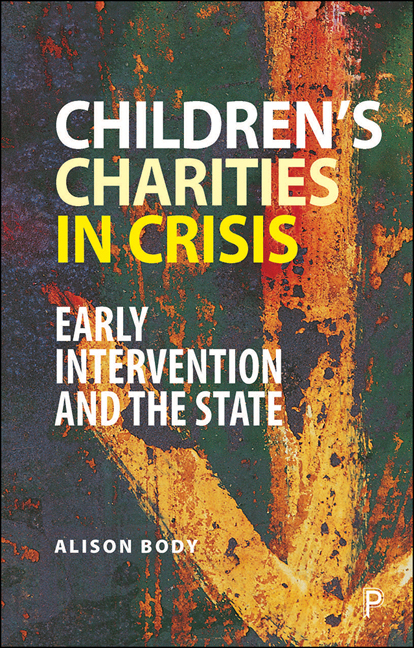Book contents
- Frontmatter
- Dedication
- Epigraph
- Contents
- List of Figures and Tables
- About the Author
- Acknowledgements
- Introduction
- Part I Preventative Services and Children’s Charities: Policy and Paradigm Shifts
- Part II On the Frontline of Early Intervention
- Part III The Lived Realities of Commissioning Children’s Early Intervention Services
- Part IV Concluding Thoughts
- Appendix: Data and Methods: Voices from the Frontline
- References
- Index
5 - Commissioning Children’s Services: Challenges, contestation and Crisis
Published online by Cambridge University Press: 04 March 2021
- Frontmatter
- Dedication
- Epigraph
- Contents
- List of Figures and Tables
- About the Author
- Acknowledgements
- Introduction
- Part I Preventative Services and Children’s Charities: Policy and Paradigm Shifts
- Part II On the Frontline of Early Intervention
- Part III The Lived Realities of Commissioning Children’s Early Intervention Services
- Part IV Concluding Thoughts
- Appendix: Data and Methods: Voices from the Frontline
- References
- Index
Summary
There is what commissioning is supposed to be, the story I am supposed to tell, and what commissioning is in reality … They’re two very different things. (Commissioner)
Introduction
A quick internet search of the word ‘commissioning’, and you are immediately inundated with countless ‘how-to’ toolkits and a plethora of guidance about how it is supposed to work in practice and what it is supposed to achieve. However, the lived realities of commissioning have received less academic attention. What are commissioners’ and voluntary sector providers’ everyday lived experiences of commissioning? Is it the seamless, logical process we are led to believe in the literature, or as some other commentators have suggested, is it a messier and more complex process?
Defined as ‘a cycle of assessing the needs of people in an area, designing and then securing an appropriate service’ (Cabinet Office, 2006), commissioning remains one of the most contentious issues for modern day children's charities. Early intervention and preventative services for children sit central to this debate – these statutory services at the heart of local government are often commissioned out to voluntary sector organisations for delivery, and form the very focus of this book. Over the following three chapters we explore the relationship between the voluntary sector and the state in detail, drawing on both voices from the voluntary sector and commissioners themselves.
The central argument to this section is that commissioning in its current form as a competitive market process is largely failing vulnerable children, it threatens the very survival of local voluntary sector organisations seeking to support children and young people, and, rightly so, is coming under increasing scrutiny. High profile cases such as the demise of the charity Kids Company, led by the charismatic Camila Batmanghelidjh, have brought the relationship between the state and sector to the fore of public and academic debate. In the simplest terms it raises the question of how should the state and children's charities work together to ensure the best possible outcomes for children. In this chapter we begin to unpick some of that debate, examining what has happened over the past decade, charities experiences and how we may potentially move forwards.
- Type
- Chapter
- Information
- Children's Charities in CrisisEarly Intervention and the State, pp. 109 - 144Publisher: Bristol University PressPrint publication year: 2020



